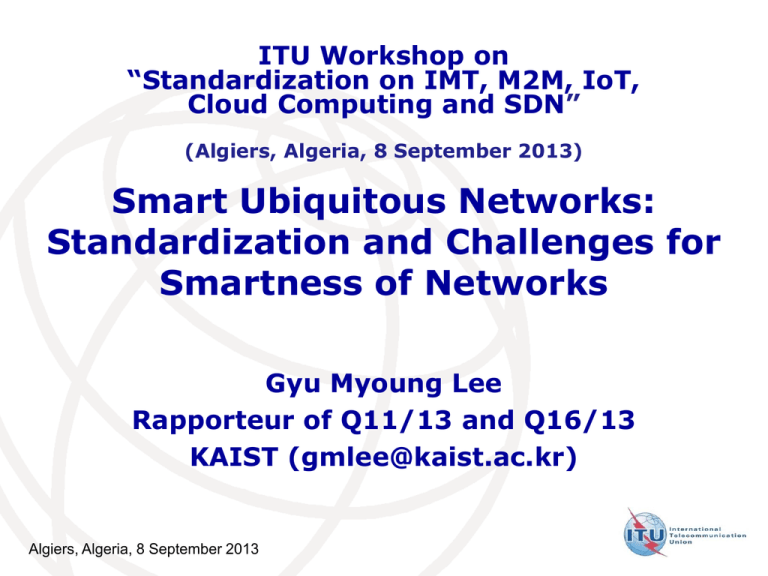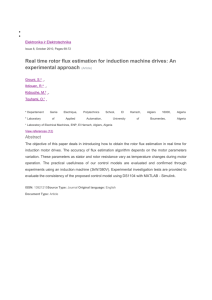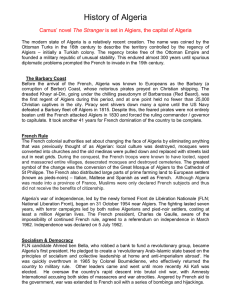Smart Ubiquitous Networks: Standardization and Challenges for Smartness of Networks
advertisement

ITU Workshop on “Standardization on IMT, M2M, IoT, Cloud Computing and SDN” (Algiers, Algeria, 8 September 2013) Smart Ubiquitous Networks: Standardization and Challenges for Smartness of Networks Gyu Myoung Lee Rapporteur of Q11/13 and Q16/13 KAIST (gmlee@kaist.ac.kr) Algiers, Algeria, 8 September 2013 Contents Introduction – SUN standardization activities SUN – overview SUN – context awareness SUN – smart traffic control and resource management SUN – content awareness Concluding remarks Algiers, Algeria, 8 September 2013 2 SUN standardization activities – 1 Discussion on the SUN in 2011 January meeting Reached a consensus that NGN developments are stable and mature enough within SG13 key mandates (develop requirements and architectures) Proposed and agreed “Smart Ubiquitous Networks (SUN)” as a new vision of SG13 Made a draft definition on “SUN” Proposal for standardization of SUN in SG13 (May 2011) Have a common understanding of SUN Identify new features and issues of SUN Develop relevant Recommendations on SUN SUN ad-hoc meetings (July 2011 and September 2011) 3 SUN standardization activities – 2 Key findings and open issues of SUN ad-hoc meetings SUN has attracted attention. 31 contributions were submitted to the two meetings. Technical meaning of ‘smart’ identified. Through discussion, it was recognized that smart means ‘context awareness’ in technical sense. A system is called smart when its behaviour changes appropriately in response to various context, e.g., location, price, and previous behaviour. Three initial work items has been identified. Three of them, context aware, content aware and smart resource management has attracted particular attention. Relationship with NGN and FN Necessity of consolidated architecture Start to develop 4 draft recommendations (October 2011) 4 SUN standardization activities – 3 Key results of SUN standardization in ITU-T 4 Recommendations Y.3041 (Overview of smart ubiquitous networks), April 2013 Y.3042 (Smart Ubiquitous Networks - Smart Traffic Control and Resource Management Functions), April 2013 Y.3043 (Smart ubiquitous networks - Context awareness framework), August 2013 Y.3044 (Smart ubiquitous networks - Content awareness framework), August 2013 1 on-going draft recommendation Y.SUN-cdf (Smart ubiquitous networks - Functional architecture of content delivery) Algiers, Algeria, 8 September 2013 5 SUN - Overview This Recommendation Describes overview of Smart Ubiquitous Networks (SUN) with identifying high level features of SUN including requirements of these features (and also identifies design principles of SUN) Necessity of SUN from social, network innovation and network capabilities aspects in smart ubiquitous environment Concept of the SUN (e.g., Definition and key characteristics of SUN); High level features of SUN High level requirements of SUN 6 Smart Ubiquitous Networks Definition of SUN Smart ubiquitous networks are IP-based packet networks that can provide transport and delivery a wide range of existing and emerging services to people and things. The services provided by the networks can cover aspects such as control, processing and storage. The networks are smart in the sense that they are knowledgeable, context-aware, adaptable, autonomous, programmable and can effect services effectively and securely. The networks are ubiquitous in the sense that they allow access anytime anywhere through varied access technologies, access devices including end user devices, and human-machine interfaces. 7 Why “Smart”? Innovative communication Knowledge-based: from person, service and network Autonomics Self and adaptive networking with OAM&P Context-Awareness Awareness of applications, location, energy, environment Without human intervention Collaborating among networks, devices, content and applications Smart Networks consists of distributed control and management systems. 8 Why “Ubiquitous”? At any where The capacity to access and use a specific service through different access technologies and physical devices At any time The service must be “always-on” With any object Enabling the use of a wide variety of nonPC equipment Ubiquitous Networks consists of innumerable number of computing devices embedded in almost everything around us, platforms and networks that interconnect them, and user devices that make use of and act on the available information. 9 Smart Ubiquitous Networks From the definition of SUN, functional features: Based on the IP-based packet transport same as NGN with secure of services Support “Things” as well as support “People” cover “Processing and Storage” which are beyond NGN coverage Have features of “knowledgeable, context-aware, adaptable, autonomous and programmable” which are partially covered by NGN but SUN should provide wider scopes and better ways to support these features 10 SUN as a short term realization of FNs SUN use IP-based environment, but add more capabilities to support services in smart ways taking into account the knowledge resulting from the context awareness. A key objective of SUN is an enhancement of networking capabilities of IP-based networks by an optimized and efficient use of various resources (e.g., resources for networks, services and end user devices), for the benefit of not only human beings but also things. With this enhancement, SUN support various services and applications, taking into account the context of the end user, the network and service provisioning. Algiers, Algeria, 8 September 2013 11 Key features of SUN 12 High-level architecture of SUN Algiers, Algeria, 8 September 2013 13 SUN – Context Awareness Context awareness capability of SUN Enables networks to dynamically capture context information and monitor the context change in order to be adaptive based on user characteristics and the environment Context awareness provides the following characteristics Distributed control and management of context sources The reduction of complexity The incorporation of autonomics Algiers, Algeria, 8 September 2013 14 High level functional model for context awareness in SUN Context Sources User Device Context Awareness Functions Context Repository / Knowledge Base Network Service Content Context Gathering Context Management & Analysis Context Request & Delivery Network Control and Management Context Users (network entities) Algiers, Algeria, 8 September 2013 15 Context awareness to support other networking capabilities Algiers, Algeria, 8 September 2013 16 Relationship among NGN, SUN and FN in terms of context awareness 4 Objectives of FN “Smart” Feature of SUN Extension of NGN Mechanisms Algiers, Algeria, 8 September 2013 Service Awareness Data Awareness Environmental Awareness Social and Economic Awareness Context Awareness (Context Control & Management) Context Aware QoS Context Aware Mobility Context Aware Security 17 SUN - Smart Traffic Control and Resource Management This Recommendation Specifies smart traffic control and resource management functions to provide fair usage of network resources using context awareness capability in SUN. This document covers the following Motivation and objectives of smart traffic control and resource management Requirements for smart traffic control and resource management for SUN High level architecture and functional architecture Control and management mechanisms Algiers, Algeria, 8 September 2013 18 Monopolization of traffics in fixed network, 2010 Algiers, Algeria, 8 September 2013 19 Three different area of network operation Value High Area 1 Area 2 Service Quality Of video Area 3 Delay & Jitter Satisfaction of Network performance Low Under Utilization Algiers, Algeria, 8 September 2013 Optimal Utilization High Utilization Bandwidth Utilization 20 Fine-grained classifications of traffic Service Duration Type 0 (up to 1 kb/s) Type 1 (1 - 128 kb/s) Type 2 (128 kb/s - 2 Mb/s) Type 0 Type 1 Type 2 Type 3 Type 4 (less than 1 second) (1 second less than 10 minutes) (10 minutes – less than 30 minutes) (30 minutes less than 1 hour) (over 1 hour) NYI NYI NYI Simple sensor data Sensor data Text (SMS) Complicated sensor data MMS Voice phone/ messaging Voice Phone Voice Phone Voice conferenc e Voice Conference Low-Q Video messaging & video clip HQ music Low-Q Video phon e/conferen. Inter-mediate size file transfer P2P download Web TV Web casting P2P download Web TV/casting Tele-Video-Surv eillance HD Video mes saging & vide o clip HD Video Phone & conference Big size file transfer IPTV(Drama) P2P Download Network game Video confer. E-Health appl. IPTV (Movie) P2P Download Network game Video conf. E-Health appl. 3D-Video messaging 3D-based Web con tents 3D TV 3D-Telepresen. Nuclear Researc h appl. E-Health appl. Nuclear Researc h appl. NYI Bandwidth Type 3 (2 - 20 Mb/s) NYI Type 4 (bigger than 20 Mb/s ) NYI NYI: Not Yet Identified Class 0 Algiers, Algeria, 8 September 2013 Class 1 Class 2 Class 3 21 High level architecture of STCRMF Context aware capabilities Portals Users VNOs Access Core Access CPs Users Users Users Traffic Monitoring / Analysis Resource Monitoring / Analysis Resource Management Smart Resource Management Capabilities Algiers, Algeria, 8 September 2013 22 Functional architecture of STCRMF Context Awareness Functions Te Tw TMAF TM-FE RMAF TA-FE Ta RA-FE Tr Tt Ts STCRCF Td SCD-FE Tc STC-FE Algiers, Algeria, 8 September 2013 RM-FE Tf SRC-FE STCRMF 23 SUN – Content Awareness Content awareness A key feature of SUN to support an optimized content delivery service. an ability to identify, retrieve and deliver contents efficiently based on the contentrelated information considering location and/or user. SUN capabilities for content awareness Content discovery Content caching Content distribution Algiers, Algeria, 8 September 2013 24 Functional model for content awareness in SUN Algiers, Algeria, 8 September 2013 25 Content-Aware Framework Functions Algiers, Algeria, 8 September 2013 26 Structure of Content Service Coordination Function Algiers, Algeria, 8 September 2013 27 Structure of Content Delivery Control Function Algiers, Algeria, 8 September 2013 28 Concluding Remarks Key objectives of SUN are to bring smart capabilities into the telecommunication networks. especially addressing the support of context aware networking Thus future work for SUN should focus on an early realization and deployment with feasible technologies. Algiers, Algeria, 8 September 2013 29 Q&A Algiers, Algeria, 8 September 2013 30




